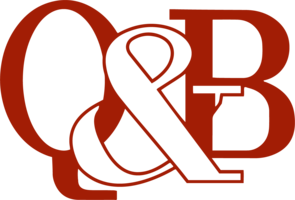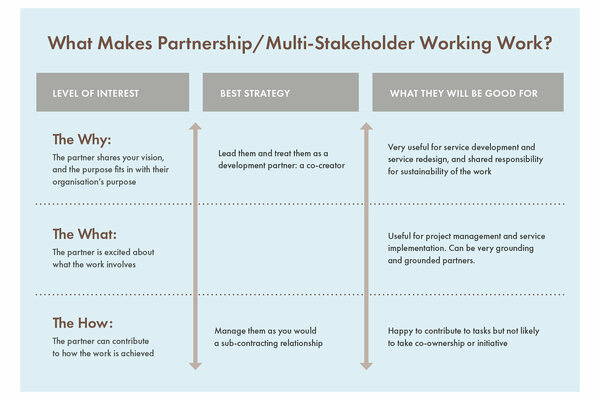Differences
It’s no surprise that the Covid-19 crisis is changing the way we think about work. In amongst the sudden shift to remote relationships and home working, we can also discover a lot about who our most valuable, most like-minded partners are.
In times like these, it quickly becomes clear which of our partners are in it for the long haul and which are not. Of course, this can happen outside the extreme circumstances of a pandemic – it could be during the opening phases of a multi-stakeholder project, or perhaps when you’re discussing a funding application with a potential partner. But times of rapid change and uncertainty force the issue.
I often help my clients differentiate between different types of partners and stakeholders. And, having spent the last 15 years delivering courses on partnership development and stakeholder influencing, I think there’s something missing from a lot of the models out there – another level of partnership. Which leads me to consider the psychodynamics of partnership working.

Why, What and How
Any organisation or individual operates with a whole tapestry of different partners – it’s a word that covers a vast variety of different relationships. We have customers to which we provide goods or services. We have our own suppliers, providing us with the things we need to conduct our business. We have our colleagues and collaborators, our funders and beneficiaries. These are all ‘partners’ of one sort or another. But then we have those true partners – the people and organisations that we rely upon time and again; the people (or teams, organisations, etc.) that we are closest to.
In psychodynamic terms, that’s because we share a ‘why’ with these partners. They’ll share our vision and will be driven by the same cause. It’s a relationship with a strong foundation of trust, where each party genuinely cares about each other’s success. For individuals, it goes beyond collaboration and into co-creation. And for organisations, it represents fertile ground for strategic alignment. In times like these, it’s the ‘why’ partners who pick up the phone, who will be proactive about trying to maintain the relationship. “We know you’re up against it right now, but we’re in this together.”
Then there are the partners that share the ‘what’ of your work: the outcome of a project or the delivery of a task. The relationship will thrive within the framework of well-defined role – they can be valuable members of a project team or a delivery partner for a particular service. But, while they might understand your aims, it’s not their cause. And, when the economy suddenly shifts, they won’t offer any flexibility. “We get that you’re struggling, but we can’t change our service to meet you.”
Finally, there are the partners that contribute to our work, but are only concerned about the ‘how’. It’s a transactional relationship, defined by a detailed agreement. A ‘how’ partner will contribute to specific tasks, but can’t be expected to take ownership or get behind a wider purpose.
Stronger
Today, we’re seeing organisations falling apart in the face of Covid-19, because their model isn’t co-creative – their ‘partners’ were either just a source of income, or of mutual convenience. Without the bonds of a clear shared purpose, of wanting to make a difference together, the partnerships don’t have the strength to survive a crisis.
For some voluntary sector organisations, it’s a challenge to their funding partnerships. Of course, many funders are involved precisely because they share your ultimate aims, so will do their best to adapt to your challenges. But other funders are focused on the terms of your funding, on the agreed ‘what’. They’ll be less accommodating of slippage, less tolerant if you suddenly have to pivot your project to meet new circumstances. For them, a new project means finding new funding.
Many organisations are better suited to changing times – cooperatives, social enterprises, employee-owned firms and local businesses that are integrated with their communities. These are all built on a strong foundation of partnership working, giving them the power to deal with complexity.
I saw a recent story about East Coast Organics employing former volunteers to help them deal with a surge in veg box orders; turning to people they know share their mission. Then there are those businesses with an employee-ownership model, like Lothian Buses or John Lewis – perhaps not every employee has a say in every decision, but they do share a common purpose. I’m seeing organisations that have strong, purpose-driven relationships thrive and co-create amazing solutions to things as they go, even with today’s struggles.
Your partners can’t all share your ‘why’; diversity is what makes it sustainable. The tapestry is important. But, to survive this current change in our economy and to build anew in the years ahead, we need to understand where our mutual dependencies lie. We need to ask ourselves which partnerships are worthy of our time, effort and commitment. And that’s where I think this model can be valuable. On one hand, we can save time on those relationships which are actually subcontracted or transactional. Of course, we should be honourable, live by our values and work within defined terms and conditions. But we don’t need to commit ourselves or invest time in these relationships. On the other hand, we need to behave like good ‘why’ partners to others. We need to make sure that we share not only a purpose, but our time, ideas, opinions and support. Go for coffee, get to know them on a personal level. Then, when you’re faced with challenges, it’s these partnerships that will endure. While others fall away, your real partners will look beyond today’s ‘what’. They’re in it for you, even if it means co-creating a new vehicle for achieving your shared ‘why’. Your model was popular both for its focus on values - the ‘why’ and its clarity and accessibility. Exploring it in detail, as part of the session, was appreciated and stimulating. The mix of principle and experienced-based practically did mean folk were keen to share.
This article by member Duncan Wallace was originally published on his website www.duncanwallace.org.uk/

